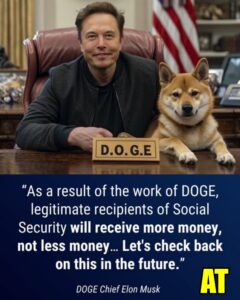Elon Musk Addresses Concerns Over DOGE’s Cost-Cutting Measures in Exclusive Interview with Bret Baier

In a highly anticipated exclusive interview with Fox News anchor Bret Baier, billionaire entrepreneur Elon Musk tackled a pressing concern among many Americans—whether DOGE’s cost-cutting strategies could negatively impact their benefits. As a visionary known for pushing the boundaries of technology and business, Musk has been a vocal advocate for cryptocurrency, particularly Dogecoin (DOGE). However, as more companies and industries adopt DOGE for transactions, some fear that cost-saving measures associated with the digital currency might come at the expense of everyday citizens.
So, is there any truth to these concerns? Or is this just another misunderstanding in the rapidly evolving world of cryptocurrency?
Musk’s Take on DOGE’s Role in Cost-Cutting
Elon Musk, a self-proclaimed fan of Dogecoin, has played a significant role in the meme-inspired cryptocurrency’s rise. His tweets and endorsements have contributed to DOGE’s popularity, turning it from an internet joke into a legitimate digital asset. But while Musk has praised DOGE for its efficiency and potential, critics worry that the cost-cutting measures associated with its adoption could hurt workers, retirees, and those who depend on government benefits.
When asked about this concern by Baier, Musk was quick to set the record straight:
“I think it’s important to differentiate between cost-cutting that improves efficiency and cost-cutting that reduces benefits. The goal of using DOGE in transactions is not to take anything away from people, but rather to make payments faster, cheaper, and more accessible.”
Musk explained that by utilizing blockchain-based transactions, companies could cut out unnecessary middlemen, reducing fees and administrative costs. This, he argued, could actually increase financial accessibility rather than hurt everyday Americans.
How DOGE’s Cost-Cutting Measures Work
To understand the potential impact of DOGE’s cost-cutting strategies, it’s important to break down how they work. Unlike traditional banking systems that rely on multiple intermediaries to process transactions, Dogecoin operates on a decentralized blockchain network. This means:
Lower Transaction Fees
Sending money with DOGE is significantly cheaper than using traditional financial institutions, which often charge high fees for wire transfers, credit card transactions, and international payments.
Faster Payments – Transactions on the Dogecoin blockchain are confirmed within minutes, compared to traditional bank transfers that can take days.
Reduced Need for Middlemen – With fewer intermediaries involved, businesses and consumers can conduct transactions more efficiently, reducing unnecessary costs.
Musk argued that these benefits could help companies pass on savings to customers and employees rather than taking away from benefits.
Addressing the Fears of Everyday Americans
Despite Musk’s optimism, concerns remain. Some Americans worry that if major companies start using DOGE to cut costs, they might also start reducing employee benefits, wages, or government assistance programs. Critics fear that, just like past automation and outsourcing trends, cost-cutting measures could lead to job losses or reduced social safety nets.
Baier pressed Musk on this issue, asking whether DOGE could contribute to economic inequality. Musk responded:
“I think it’s a mistake to assume that cost-cutting always means job losses or fewer benefits. In fact, by reducing inefficiencies, companies can reinvest those savings into better wages, more innovation, and improved services. The problem isn’t the technology—it’s how companies choose to use it.”
He added that the adoption of DOGE and other cryptocurrencies should be seen as an opportunity to empower individuals financially rather than a threat.
The Future of DOGE in Business and Government
As more businesses explore using DOGE for transactions, the debate over its impact on the economy will only grow. Some experts argue that widespread adoption could help create a more inclusive financial system, allowing people who are unbanked or underbanked to participate in the digital economy. Others worry that the volatility of cryptocurrencies makes them unreliable for long-term financial planning.
Musk acknowledged these concerns but remained confident in DOGE’s potential:
“Like any emerging technology, there are risks. But I believe the benefits far outweigh the drawbacks. The key is responsible adoption and regulation that ensures people are protected while still allowing innovation to thrive.”
Some lawmakers and policymakers are already discussing how cryptocurrency could be integrated into government systems without disrupting public benefits. While no major government programs currently use DOGE, Musk suggested that in the future, blockchain technology could help improve transparency and efficiency in public spending.
Final Thoughts: Should Americans Be Worried?
Elon Musk’s interview with Bret Baier shed light on an important issue that many Americans are thinking about. While DOGE’s cost-cutting measures could revolutionize financial transactions, fears remain about how businesses and governments might use these savings.
Musk’s argument is clear—Dogecoin itself is not the problem. Instead, the way companies and institutions implement cost-cutting measures is what matters. If used responsibly, DOGE could help reduce transaction costs, improve efficiency, and even benefit workers and consumers. But if misused, it could lead to the kind of corporate greed that critics fear.
Ultimately, as DOGE continues to grow in popularity, the conversation around its impact will continue. But one thing is certain—Musk isn’t backing down from his vision of a future where cryptocurrency plays a major role in the global economy.
So, should Americans be worried? Or should they embrace the future of digital finance? That remains to be seen, but one thing is for sure—when Musk speaks, the world listens.
News
NBA teams are preparing to steal Al Horford from the Celtics (again)
NBA teams are preparing to steal Al Horford from the Celtics (again) Boston Celtics, Al Horford, NBA free agency, NBA…
BREAKING NEWS: Patrick Mahomes Purchased His Mother Randi Her Dream House
In an awe-inspiring act of gratitude and love, Patrick Mahomes, the celebrated quarterback of the Kansas City Chiefs, along with…
‘I was more worried about being drafted than I was about being a dad’: Jayson Tatum lifts the lid on keeping his girlfriend’s pregnancy a secret from the NBA in 2017 – and how he was ‘terrified’ teams wouldn’t pick him
‘I was more worried about being drafted than I was about being a dad’: Jayson Tatum lifts the lid on…
Jason Tatum Lifestyle, Girlfriend, Son, Family, Boston celtics, and Net Worth
Jayson Tatum, the Boston Celtics’ prodigious forward, has captivated the basketball world with his electrifying performances and compelling personal narrative….
Jayson Tatum and his rich life with his son in Boston, worthy of the position of the Celtics’ highest paid player
Jayson Tatum and his rich life with his son in Boston, worthy of the position of the Celtics’ highest paid…
“Almost evicted out of our house, had to borrow food from our neighbors so I could eat” – Jayson Tatum describes the struggle his mother went through to help him become an NBA star
“Almost evicted out of our house, had to borrow food from our neighbors so I could eat” – Jayson Tatum…
End of content
No more pages to load












